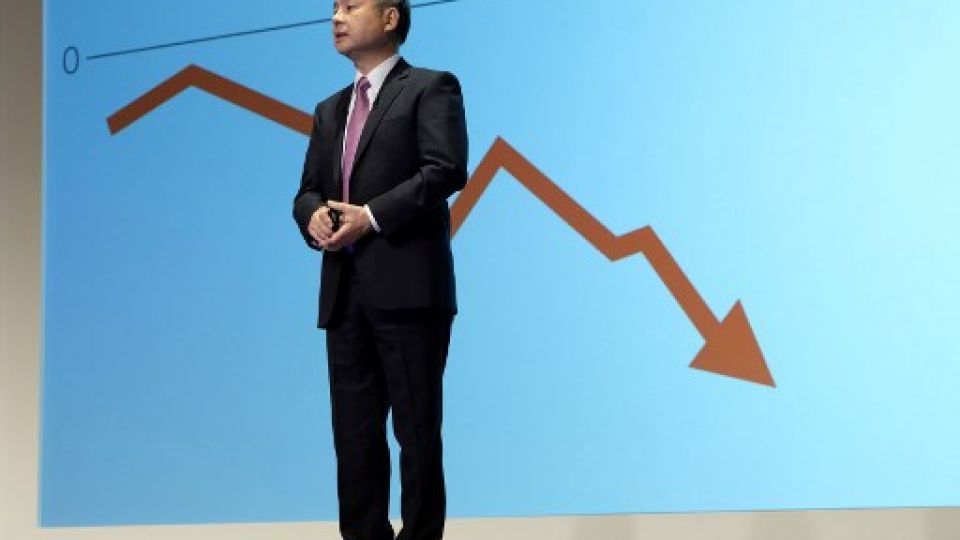November 8, 2019
By Tomofumi Yonezawa and Ryosuke Terunuma / Yomiuri Shimbun Staff Writers.
SoftBank Group Corp. Chairman Masayoshi Son took huge losses caused by investments in start-up companies on the chin, but he remains bullish about the future.
“No excuses. I’m reflecting on this,” Son said Wednesday at the start of a press conference in Tokyo after the company reported interim consolidated business results that showed operating profit in the business period ending in September had tumbled into the red for the first time in 15 years. This was due to big losses in SoftBank’s investment business, which has expanded in recent years. SoftBank’s results could even have an impact on global investment trends in start-up companies dubbed “unicorns.”
Son wore a solemn expression during the press conference, and he used the word “hansei,” which refers to reflecting on one’s past actions, at least 10 times. SoftBank booked a loss of more than ¥570 billion in its investment business. As slides projected on the stage showed an image of large waves swirling in the ocean, Son said, “It’s like a typhoon or a big storm.”
A major factor in the group’s operating loss was a loss sustained by The We Company, operator of the U.S. shared workspace provider WeWork. Members can freely use WeWork offices operating in many countries.
Son was instrumental in SoftBank’s investment in this company. SoftBank and SoftBank Vision Fund together poured about ¥1 trillion into WeWork.
However, The We Company’s debts piled up for reasons including increased capital investment costs for new buildings. Furthermore, revelations surfaced about questionable business practices engaged in by founder Adam Neumann, on whom Son had been pinning his hopes. The value of SoftBank Vision Fund’s investment in the company plunged from $4 billion (about ¥430 billion) as of the end of June to $1 billion.
“I overvalued the company, and there were some governance issues that overestimated the founder,” Son said. Consequently, SoftBank Group’s business performance quickly deteriorated in the July-September quarter, and it posted a net loss of ¥700.1 billion, compared with a ¥526.4 billion profit in the same period last year.
Earlier successes
Despite these numbers, Son remained bullish about rebuilding WeWork and his company’s future investment strategy.
His confidence stems from the success story of SoftBank’s 2000 investment in Chinese e-commerce giant Alibaba Group Holding Ltd. SoftBank’s initial holding was worth about ¥2 billion, but that has expanded to about ¥13 trillion now. In its latest earnings report, its Alibaba-related profit was enough to keep net profit in the black.
In the early half of the first decade of the 2000s, SoftBank was pushed to the brink of collapse by its telecommunications business. However, the company managed to rebuild itself. At the press conference, Son was confident he could pull off a similar result with WeWork. “SoftBank has done difficult rebuilds many times,” Son said.
There also is speculation that some of SoftBank’s other investments are failing to fire. SoftBank has invested, albeit on a smaller scale than it has in WeWork, in companies such as the U.S. dog-walking service Wag Labs, Inc. and South Korean online retailer Coupang. As of the end of September, SoftBank Group’s interest-bearing debt had climbed to ¥7.58 trillion.
Major banks also are keeping a close eye on SoftBank’s moves. These banks increased their financing to the group, which maintained a strong appetite for investments at a time when domestic demand for funds has been lukewarm. Mizuho Bank, SoftBank’s main bank, also is deepening its ties with the company, as indicated by its willingness to provide up to $500 million for a second Vision Fund.
There are mounting concerns SoftBank could struggle to raise funds due to its massive investment losses, but Son remained undeterred. While admitting the latest earnings were “terrible,” he said they “would not significantly affect” the company’s investment strategy. “We won’t change our strategy. We’ll just quietly keep moving forward,” Son said.
Even so, major banks are cautious. “We’re on guard against any impact that might arise if an investment doesn’t go well,” a senior official at one such bank said.


